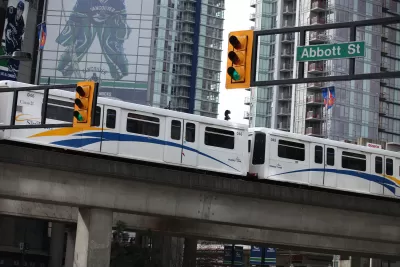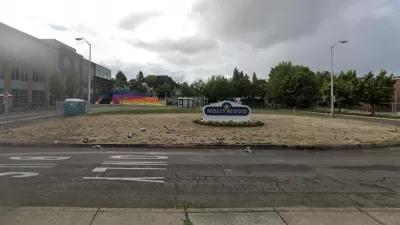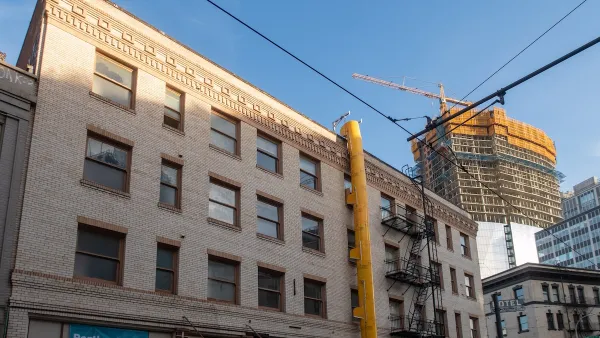Jarrett Walker examines the desirability of slow transit as argued by University of British Columbia Professor Patrick M. Condon in support of a vast streetcar network for Vancouver.

Walker inserts himself into the Broadway rapid transit debate in Vancouver to prove a point about the value of slow versus rapid transit. Walker picks his fight with Condon, who proposes building a streetcar network for Vancouver, rather than extending the city's existing driverless metro system, SkyTrain, to his own campus, UBC, which lies at the western tip of the city. While the Portland Streetcar, which Condon praises as a model system, did little for that city's mobility, it did much for infill redevelopment, acknowledges Walker.
Was that a unique case though? "Is it really true, as Condon suggests, that sustainable urban form, with fine-grained mixtures of uses that permit most of life's needs to be met close to home, will grow better around slow transit, like a streetcar, as opposed to something fast like a subway?" asks Walker.
"As I think about the great urban spaces I've seen, at many scales, on many continents, I am simply not convinced that highly civilized urban places benefit from transit being slow When I think of really healthy, vibrant, exciting neighborhoods in Europe, or in New York City, I think of places with subway stations," argues Walker. "Once people are used to rapid transit, it comes to function as a driving force in determining where people can live at high density, and enables the continued growth of highly sustainable dense urban form."
Thanks to Jessica Hsu
FULL STORY: is speed obsolete?

Planetizen Federal Action Tracker
A weekly monitor of how Trump’s orders and actions are impacting planners and planning in America.

Maui's Vacation Rental Debate Turns Ugly
Verbal attacks, misinformation campaigns and fistfights plague a high-stakes debate to convert thousands of vacation rentals into long-term housing.

San Francisco Suspends Traffic Calming Amidst Record Deaths
Citing “a challenging fiscal landscape,” the city will cease the program on the heels of 42 traffic deaths, including 24 pedestrians.

Amtrak Rolls Out New Orleans to Alabama “Mardi Gras” Train
The new service will operate morning and evening departures between Mobile and New Orleans.

The Subversive Car-Free Guide to Trump's Great American Road Trip
Car-free ways to access Chicagoland’s best tourist attractions.

San Antonio and Austin are Fusing Into one Massive Megaregion
The region spanning the two central Texas cities is growing fast, posing challenges for local infrastructure and water supplies.
Urban Design for Planners 1: Software Tools
This six-course series explores essential urban design concepts using open source software and equips planners with the tools they need to participate fully in the urban design process.
Planning for Universal Design
Learn the tools for implementing Universal Design in planning regulations.
Heyer Gruel & Associates PA
JM Goldson LLC
Custer County Colorado
City of Camden Redevelopment Agency
City of Astoria
Transportation Research & Education Center (TREC) at Portland State University
Jefferson Parish Government
Camden Redevelopment Agency
City of Claremont




























